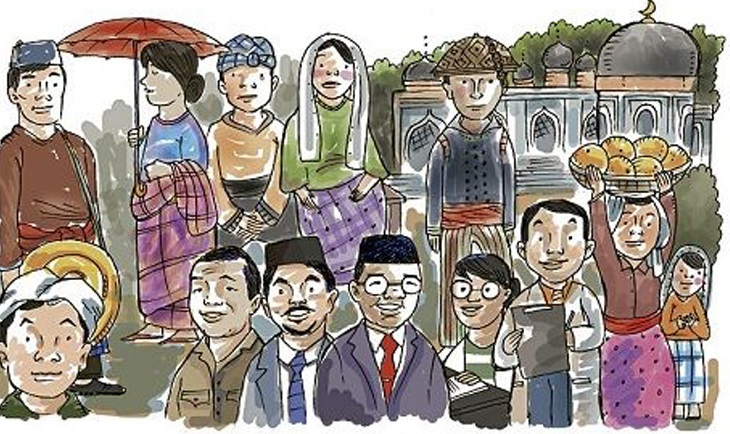To be unwittingly anti-Moro
I was born in a family where the favorite bogeyman was the Moro. My grandfather came to the Philippines in the 1890s with the Spanish civilian bureaucracy and was assigned to Mindanao. That probably was a factor, as we know from our history that even the name Moro, pejorative as it was then, came with the Spanish hatred of its once Moorish conquerors.
But in school, I learned that friends and classmates had the same bogeyman. And that he was as nasty and as cruel as mine. We were conditioned to believe he would snatch children away from their families, bundle hapless tots inside a sack never to be returned again. With such childhood upbringing, who would not ever grow up thinking that the Moro was indeed a monstrosity?
Growing up in Mindanao, our nearest geographical neighbors to come close to that were the Maranaos. But our city was a solid “Christian” enclave, or so we had been trained to believe. In the 1960s up to 1970s, there were few Maranao traders in town. It was a time not meant for cultural diversity and it certainly reinforced well our childhood drill of “them” and “us.” “Them” was as unlike as people from another planet not like ours.
Maturity plus a postgraduate anthropology career on Mindanao culture divested me of years of anti-Moro biases. I had created numerous contacts with many Moro people, visited their communities countless times, developed lifelong friendships with many that last till this day. I was treated to a staggering surprise: the Moro are just like you and me. They are as ordinary as having good and bad elements among them as with any other ethnic group, mine certainly included.
It is possible to stop ethnocentrism, as one reader wrote, because “evil leaves you when you don’t feed it.” I have imposed upon myself the standard of not calling them Muslims, although they are, if only to disabuse myself that religious differences do not matter in human relations. We teem with so many anti-Moro biases. One, bordering on the absurd, even claims the place Intramuros is called such “so that the Moros will not intra,” when the name really means “within the walls.”
Over the years, I have seen Moro students going on to live and study in my once touted “Christian enclave.” The young of today easily socialize in mixed peer groups of diverse ethnicities. An acceptance of religious differences has slowly come into practice.
We thus wrongly thought that the colonial biases against the Moro, which had been passed on to us, had fizzled out in this age of openness to cultural differences. It came as a shock when the same bigoted slants came alive again, some as base as the certainly medieval inanity that “a good Moro is a dead Moro.” That is not truth.
Most of us do not have a first-hand understanding of the Moro people because we have not ever stepped on Moroland. Our dangerous ignorance is compounded by our predilection to generalize cultural traits from the handful of characters we encounter. Many of us would probably find it unthinkable to join the Moro for the iftar when they break the fast during Ramadan. Few would probably consider breaking bread with them when they celebrate a kanduli for a family gathering. It must go without saying, who are we to judge?
We must love the Moro because we are born of the same Filipino fraternity. Unknown to millions of Filipinos who live outside Mindanao, many Moro and non-Moro have lived side by side for a century of peaceful coexistence. One will be amazed to discover that within the very Moro town of Mamasapano on the road to Tukanalipao, there thrives a small community of Catholics who have lived there for decades, unmolested, mind you, with their own community chapel standing peacefully in that farming landscape. This is the model we must aim for.
Ignorance and ethnocentrism are not the ways to judge the merits and demerits of the Bangsamoro Basic Law. But so is the wrong political lens. The BBL does not have the nature to grant the sufficient degree of self-determination because what ails us primarily is a highly centralized Manila that can still impose its regime of political patronage on the Bangsamoro. Real self-determination for the Moro masses can only come under a regime free from Manila imposition and traditional politics. Granting a law with constitutional infirmities is a bad example of love for country. By creating a false veneer, the age-old biases and mistrust will remain. It is bad faith.
As Filipinos, we were taught love of country by respecting the basic law of the land. But the same administration with a penchant for constitutional circumvention now tells the Moro people that it can grant self-determination by defiance of the same constitution. This is not the road to Mindanao peace.
Self-determination cannot be granted to one by denigrating the other. The BBL is fraught with so many possibilities for disenfranchisement of the other Moro stakeholders, not to mention its nebulous motherhood statements on the fate of the indigenous peoples. A cheering squad of a peace council is being led to idiocy.
Delicate care must be made so that we do not ultimately end up unwittingly being anti-Moro. We cannot dance with the devil.





















